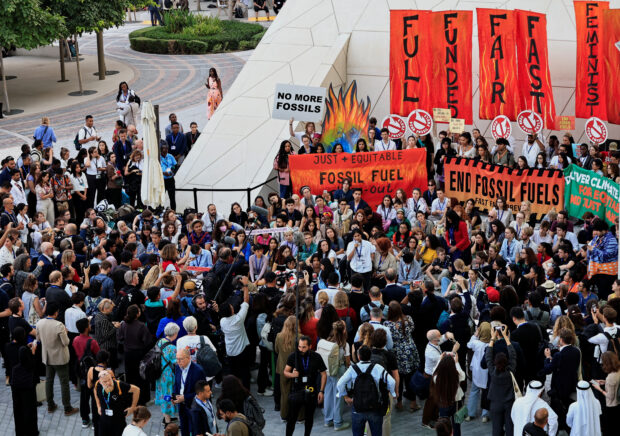Infrastructure faces $600B hit in worst-case climate shift – study

Climate activists protest against fossil fuels during the final stages of the United Nations Climate Change Conference (COP28), in Dubai, United Arab Emirates, Dec 12, 2023. REUTERS/Thaier Al-Sudani
DUBAI – Infrastructure investors face losing nearly a third of their money, or around $600 billion, if countries do not plan for an orderly shift to a greener economy by mid-century, a first-of-its-kind study shared with Reuters showed.
The researchers describe this worst–case scenario in terms of governments moving late, or unexpectedly, to impose taxes on carbon emissions. Those abrupt moves would drive an inflation-fueling price shock that would see interest rates rise, impacting the net-asset value of the investments.
Infrastructure portfolios could lose as much as half of their value, according to the research by the EDHEC Infrastructure & Private Asset Research Institute.
“There’s more risk than people think,” co-author Frederic Blanc-Brude told Reuters by phone, while the COP28 climate talks were taking place in Dubai. “They are going to become material sooner, and more than is expected, and people need to wake up.”
READ: Cost of climate change in poor countries to run up to $1.2 trillion per year by 2060
Article continues after this advertisementIn an orderly transition, by contrast, where the system changes gradually to rein in emissions, the costs would be absorbed as part of normal business operations.
Article continues after this advertisementBoth scenarios were assessed across 9,000 infrastructure assets – including airports, toll roads, power stations, seaports and pipelines – but did not include potential legal, market and technological costs, so were conservative, Blanc-Brude said.
Without an orderly transition, the biggest “transition” shocks would be felt by investors in energy and water companies, where they face the risk of a 38-percent percent loss, or some $86 billion, according to the study.
Network utilities could lose 33 percent percent of their value, or $104 billion. Data infrastructure was at 32 percent, or $61 billion.
Physical risks
The study also looks at the so-called physical risks from climate impacts, or the damage done to infrastructure by fires, floods or typhoons.
READ: Don’t care about climate change? Wait until it hits you in the face
Without government action to reduce emissions and control climate change, the study finds that the net-value of assets would fall overall by some $140 billion by 2050 and would impact every sector, albeit unevenly.
Investors face a risk of 25 percent net-asset-value loss in North American infrastructure, and 16 percent for European and Asian assets.
Crucially, infrastructure assets in all regions and countries already face a drop in value of 1 percent to 5 percent this year – and that level of risk would remain even in an orderly transition scenario.
There are no signs that this orderly transition is happening, he said.
Blanc-Brude said institutions have proven “incapable” so far of changing how they work, for example by assessing and reporting their financial risks in full.
The difficulty for investors is that “it’s either really bad – or even worse, because if you do decarbonize it’s going to cost a lot, and if you don’t it’s going to cost even more,” Blanc-Brude said. “There’s no good version of the story, so it’s difficult for an organization.”
Bailing out of infrastructure assets was not the solution, either, he said, as every asset class would be hit: “Infrastructure can be made more resilient, whereas it’s not necessarily that obvious for other types of businesses.”